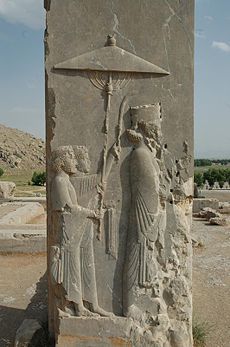Bible: What Does Esther 1-3 Teach Us About Women's Rights and Submission to Authority?
Xerxes (Ahasuerus)

Susa (Shushan), Capital of Persia (Iran)

Vashti

A Very Large Banquet
THE BOOK OF ESTHER
During the third year of Xerxes' reign, the king presides over an extravagant, six-month long party for the nobles of the one hundred twenty-seven provinces under his rule for no reason other than to boast of his wealth and power (vv. 1-4).
Afterwards, in his magnanimity, he makes a feast for the people of Susa [Shushan], the Persian capital, for one week (v. 5).
The author describes the lavish furnishings in Ahasuerus' [Xerxes'] court, including its curtains, couches, and drinking vessels (vv. 6, 7).
[An interesting fact of Persian court law states that drinking wine was not mandatory (v. 8)].
Simultaneously, Queen Vashti holds a separate women’s banquet (v. 9).
Xerxes orders seven eunuchs to ready Vashti, so that she may display her beauty before his guests (vv. 10-11).
When she refuses to comply with his wishes, he becomes furious (v. 12).
Consequently, the king consults seven wise men, who advise him to depose Vashti (to avoid a general rebellion of wives toward their husbands, vv. 13-18), and give the position to another young woman.
Having the maintenance of domestic tranquility as their purpose, these leaders record the king’s decree in the "unalterable" law books of the Medes and the Persians (vv. 19-20).
Xerxes then executes this edict by sending letters to all provinces, requiring that the man be master in his own house (vv. 21-22).
We can understand this incident in several ways:
(1) Vashti rebelled against legitimate male headship in that society;
(2) The queen rightly refused to put herself on display to bolster Xerxes' egomania;
(3) She made a statement against the injustice of overbearing male dominance in near Eastern society;
(4) The fact that Xerxes sought advice from seven wise men showed that he had earned no respect from Vashti and thus had to resort to brute authority to get his way.
Esther (Hadassah)

Relation of Esther to Mordecai
view quiz statisticsEsther 2
Ahasuerus’ servants advise him to choose a new queen from among all the young virgins in the empire (vv. 1-4).
The author introduces Mordecai and the beautiful Esther (Hadassah), his uncle's daughter, whom Mordecai had adopted after her parents had died (vv. 5-7).
The Persian king takes Esther to Shushan and puts her under the custody of Hegai, his eunuch.
After favoring her with beauty treatments, her allowance, and seven maidservants, he gives her the best place in the house (vv. 8-9).
She tells no one that she is Jewish, for disclosing that knowledge would cause the Persians to perceive her as a threat (v. 10); an anxious Mordecai frets every day about her welfare (v. 11).
Persian law for "the virgins" specifies twelve months' beauty preparations before visiting the king (vv. 12-13).
After their visit, they then dwell in a second house and return only if the king likes them (v. 14).
Esther finds such great favor before Xerxes that he makes her queen (vv. 15-17).
After her selection, Xerxes proclaims a holiday in the provinces, and everyone celebrates the Feast of Esther (v. 18).
Meanwhile, at the command of Mordecai, the new Highness keeps her heritage hidden (vv. 19-20).
Mordecai then shows his faithfulness to Xerxes, preventing an assassination attempt against him (vv. 21-23).
This loyal deed becomes a matter of record in the book of the chronicles (v. 23).
[Later developments will show that the hand of God had been shaping this part of history all along].
Purpose of Casting Lots
view quiz statisticsEsther 3
"After these things" (cf. 2:1), that is, after Xerxes acknowledges Mordecai's patriotism according to the records, the king, giving no reason for his action, promotes Haman to a high position (v. 1).
When this new official pompously parades around the palace, expecting the admiration of all, Mordecai, unlike the other servants, does not bow to him (v. 2).
Incensed by this affront, Haman investigates his detractor’s background and discovers Mordecai's ancestry; full of hatred, he consequently seeks the extermination of all Jews (vv. 3-6).
After casting the lot (Pur, pl., Purim) to determine the date of their demise (v. 7), Haman bears false witness against the Jews before Ahasuerus, accusing them of disobedience to the laws of Persia, and asks him for permission to commit genocide (vv. 8,9).
The king callously and thoughtlessly allows him, the enemy of the Jews, to annihilate them (vv. 10-11).
Haman's scribes compose a decree and send it to the leaders of all provinces, ordering them to kill all Jews on 12/13 and to plunder their possessions (vv. 12-13).
Couriers bring the people of Susa baffling news about the future execution, while Haman and Ahasuerus toast their decision (vv. 14-15).
[Mordecai probably never thought that Haman would take his action to the extreme measure that he did; however, even if he did think that deed were a distinct possibility, he appeared certain that Ahasuerus would never comply with these insane wishes.
Still, if "worse should come to worst," the good Jew would stand ready to die for his faith].
© 2014 glynch1








